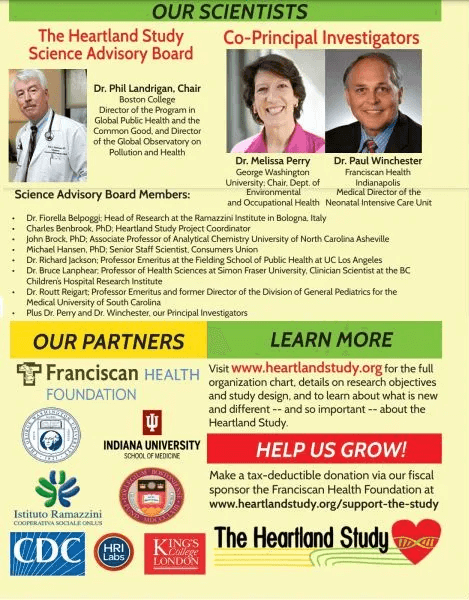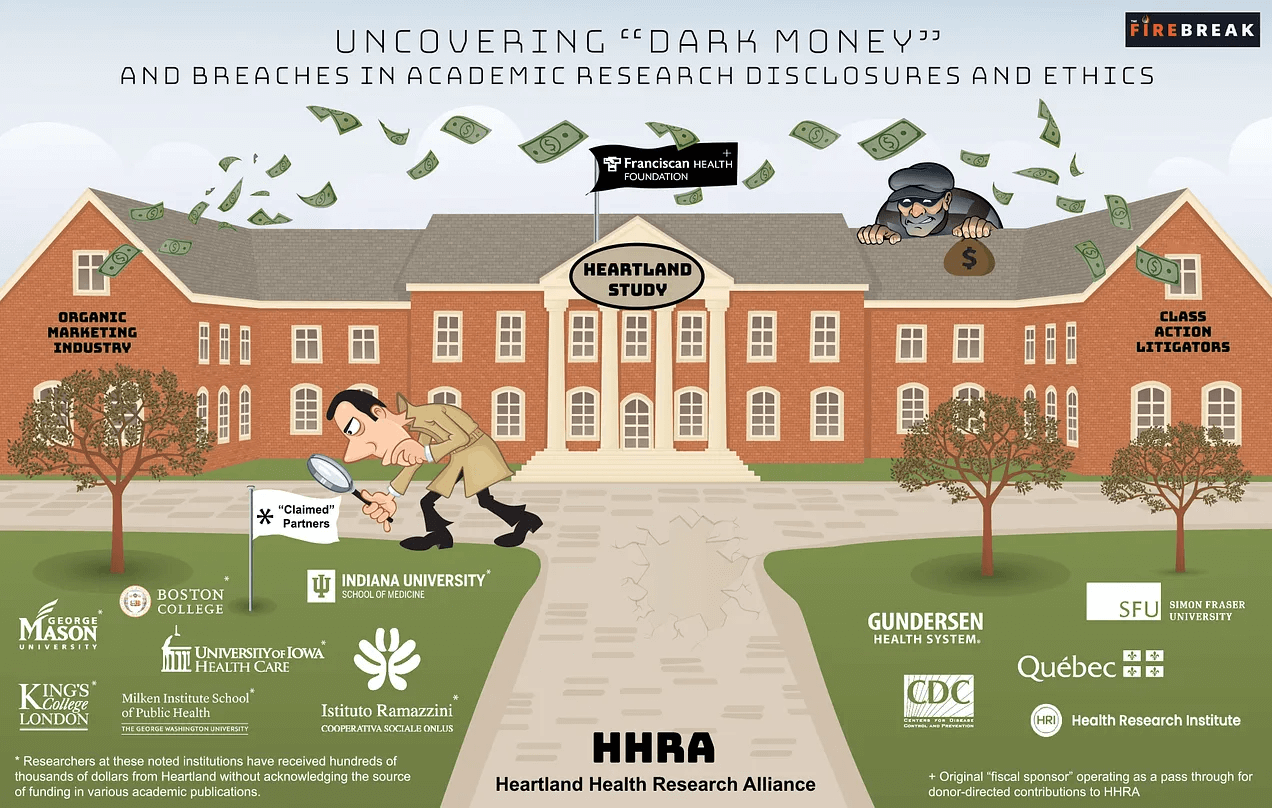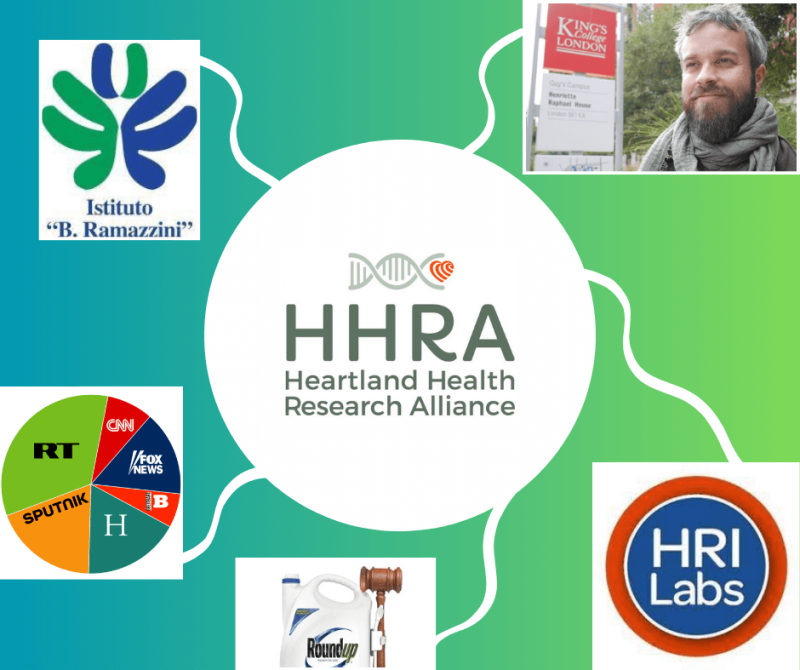This [third article in my series reviews] the groups the HHRA are allegedly partnering with and the credibility of their relationships. For some aligning with HHRA, particularly medical institutions, their relationship may well undermine their appearance of independence and commitment to responsible research.
The Heartland Health Research Alliance (HHRA) has pushed aggressively to make an impact with the media and the scientific community for the stakeholders funding them. As they deliver their promised conclusions on the effects on pregnant women from trace levels of herbicides and the assumed epigenetic effects on their children into adolescence, all the intersecting Heartland interest groups should expect to benefit from their association. Part 1 of the Heartland exposé looked at how they were relying on funding from the organic food industry lobby, tort law firms and via (dark) donor-advised funds. The second part looked at how the Heartland Study methodology pushed the boundaries of research integrity and ignored basic scientific norms.
This final section will look at the groups the HHRA are allegedly partnering with, and the credibility of their relationships. For some aligning with HHRA, particularly medical institutions, their relationship may well undermine their appearance of independence and commitment to responsible research.
The Heartland strategy and organization was established by Charles Benbrook, an activist economist with a rather checkered past. His reach often extended beyond his paygrade. With a PhD in agricultural economics, Benbrook has authored many controversial toxicological and nutrition papers. He has been successful with financing studies and openly promising funders their desired results. He, however, lost his adjunct position at Washington State University due to having misrepresented his funding (100% from the organic food industry lobby) and failing to declare conflicts of interest in papers he published where he tied himself to the university, over-extending their relationship. After having to leave his post, he still used the university affiliations in articles and campaigns.

Partnerships or a few friends in high places?
It seems that Benbrook’s over-extension strategy followed him into the Heartland project. HHRA has claimed an impressive number of high-level academic institutions and government agencies as partners, including:
- Boston College
- George Mason University
- George Washington University
- Gunderson Health Systems
- Indiana University College of Medicine
- Kings College London
- Simon Fraser University
- University of Iowa Health Care
- Centre de Toxicologie du Québec, Minister of Health and Social Services
- U.S. Centers for Disease Control (CDC)
As the Heartland Study is performing medical research on human subjects, any academic institution partnering with the HHRA would need to go through an extensive review process via an institutional review board (IRB), a research ethics panel approval and an official publication. At the very least, we could expect a Terms of Reference or Memorandum of Understanding drawn up between the parties and published online.

Despite HHRA claiming to have been recognized for having the “highest level of transparency,” none of these partnership documents or approvals are accessible on Heartland or any presumed Heartland-partner websites. The editor of The Firebreak had contacted the new managing director of the Heartland Health Research Alliance, Russell King, to ask about the existence of such partnership approvals, Terms of Reference or Memorandums of Understanding… His circular response (he failed to answer the question) belies credibility given HHRA’s founding director, board members, and advisors’ direct roles designing and authoring Heartland Study research publications.
The HHRA director, Russell King, stated:
The HHRA is a nonprofit foundation that funds various programs. The Heartland Study is medical research. The HHRA funds but does not conduct, control, or oversee the study.
— Russell King email, 20 December 2023
We can leave his use of the word “foundation” for another article.
King’s statement ignores the fact that HHRA’s founder and executive director Benbrook was promoted by the group as its “research coordinator” as well as being a co-author of several of the Heartland Study funded project papers. Hardly the hands-off claim being promoted by Mr. King.
We suspect that, in keeping with Benbrook’s history of exaggeration and failure to disclose conflicts of interest, that the Heartland group is claiming a partnership whenever some professor or researcher from one of these institutions is funded or cooperates on a Heartland project. The simple involvement of an academic justifies the Heartland PR machine going into promotional gear to claim a partnership, but we wonder whether these institutions’ academic standards committees would be pleased with their reputations being associated with the integrity issues and low-quality research methodology used in the Heartland Study or their undisclosed donors and their special interests.
Someone should ask them.
A ship with no rudder
What’s even more disturbing is that the Heartland Health Research Alliance, while it claims that the Heartland Study is its “flagship project”, technically is not involved in the research (outside of funding it). Russell King’s email claims the HHRA “does not conduct, control, or oversee the study”. So who is coordinating the research, guaranteeing the methodology is respected, monitoring its research ethics and ensuring the quality of the publications?
According to King, we should all believe that the Heartland Study research is being done, without coordination, by a group of scientists tied to the partner organizations (who apparently don’t have any formal partnership with the HHRA). King disingenuously implies the researchers only contact with the mother ship is their funding and they are free to acquire their own data, samples and evidence and publish what they want whenever they want.
The HHRA sees its role only in funding the researchers on, what we can only assume, is an ad hoc basis (as they claim they don’t control the research). We have to then assume they will provide funding to whomever within Phil Landrigan’s and Melissa Perry’s circle of associates approaches them (without any layer of oversight). Recall from Part 1 of this exposé, that three years before the HHRA had even been established, Landrigan and Perry had decided themselves to give the Ramazzini Institute nearly a million dollars of Heartland Study funding. Recall Landrigan and Perry are both high-level Ramazzini fellows.
Incredulously the HHRA sees their main role then as to provide an extra layer of smoke to conceal the funding sources for the Heartland Study research (and nothing more). We know from its inception that most of the research funding came from tort law firms and organic food companies, but now funding is hidden away via anonymous (dark), donor-advised funds like the Franciscan Health Foundation. Researchers in this study scheme will be providing evidence for the benefit of tort lawyers and organic food lobbyists while being able to claim ignorance of any conflicts of interest. Wash, Rinse, Repeat.

The HHRA has made it known they want to increase their government funding. What agency would possibly want to provide a grant or public funds to an organization that would admit to them that they do not do the research nor have any control or oversight on the research they would want funded? And by the way, they cannot tell the government agency who has been funding them until now. I suspect only a severely corrupt agency would consider such a request.
Even more questionable are the dubious fringe food and health conspiracy promoters the HHRA are associating with.
Odd fellows
The Heartland Study has promoted their association with John Fagan at the Maharishi International University (see fundraising brochure above). The Maharishi cult is best known for their practice of yogic flying (or rather, levitation by concentration). The Heartland Study has relied on Fagan, the Maharishi Raja for Food Purity and Health Invincibility, to conduct laboratory tests. Fagan’s HRI labs are known for selling $99 home urine test kits for various alternative health marketing interests to find traces of pesticides for which they then offer to sell users natural health “cleansing” solutions. With the millions HHRA receive every year in dark donations, couldn’t they find a more legitimate lab?
In the previous two chapters, this exposé showed how the Heartland Health Research Alliance has closely intertwined its operations with the Collegium Ramazzini (including secretly underwriting their Global Glyphosate Study). Two of the main Heartland scientists, Phil Landrigan and Melissa Perry are also Ramazzini heavyweights while Ramazzini director, Fiorella Belpoggi, is on the Heartland Science Advisory Board.

Looking at the 2021 IRS declaration for grants to domestic organizations, HHRA paid $145,000 to Boston College, but this money was then allegedly transferred to the Ramazzini Institute in Italy. There is no evidence that Boston College is a sponsor of the Ramazzini Global Glyphosate Study but Phil Landrigan, from Boston College, was the President of Collegium Ramazzini. Why didn’t HHRA just transfer the funds directly to the Ramazzini Institute? Why did Landrigan only publicly acknowledge the redirecting of almost one million dollars of Heartland Study funds to the Ramazzini Institute in 2023 and only after their Global Glyphosate Study was published (with no mention of Boston College as the funding partner)? More transparency is required on the use of these Boston College funds if they were indeed a legitimate HHRA partner.
Is the Ramazzini Institute a good partner for Boston College? Ramazzini and Belpoggi played a leadership role in a prior “study” on GMOs and glyphosate which was later exposed as “fake science” and part of a Russian disinformation ruse to undermine trust in Western government regulatory systems. Given the poor reputation of Ramazzini studies, repeatedly rejected by the mainstream research community and often associated with politicized objectives, should the Heartland seriously consider throwing their lot in with this group?
But the oddest group that the Heartland is associated with are the tort lawyers … who are paying their rent.
Tort interests
Benbrook formulated the Heartland strategy while working as a litigation consultant. He secured funding from many private-equity financed tort lawyers, got one of the key lawyers involved in the glyphosate lawsuits against Bayer-Monsanto, Robin Greenwald, to serve as the board’s vice chair, and has created a structure enabling the Heartland Study to produce evidence that could be used to sue pesticide manufacturers.
The tort law firms’ and their investors objectives for financing this project are clear. If the Heartland Study can produce evidence showing enough correlations of herbicides with infant diseases, they can overwhelm the pesticide companies with thousands of lawsuits and effect (extort) multi-billion-dollar settlements (not for the plaintiffs but for the law firms and their unregulated private equity investors as industry will likely settle before any cases go to trial). And while gardeners could obtain billions from the Roundup litigation settlement, just imagine how much outraged jurors will demand for claims of infants suffering from possible herbicide health effects.
Into the wolves
There is a concern about ethically-challenged researchers getting deeply involved with the opulence, greed and avarice of the US tort law industry. Law firms pay handsome consulting fees for scientists to testify or advise lawyers (minimum $500 per hour), but even more lucrative are the finders fees paid to ethically-questionable litigation marketing firms. It costs a lot to find, screen and coach high-quality plaintiffs. Although kept discrete, it is rumored that the mass tort industry players will pay hundreds of thousands of dollars in referral fees to researchers, doctors or other hospital staff who can identify high-quality victims. This practice is illegal, certainly unethical, but it seems, does occur with some frequency. See the case of Sheldon Silver who was paid millions to provide names of plaintiffs for asbestos lawsuits.
While illegal and against all standards of research integrity, participating HHRA partner institutions should be concerned, given the close relationship between Heartland researchers and tort lawyers, that any resulting subject participation in future lawsuits will be perceived as the equivalent of a paid referral by the Heartland litigator insiders and funders. As Heartland-declared partners, these medical institutions would be under a significant legal risk. As HHRA is merely funding these researchers, there seems to be no control mechanism in place.
If a subject in the Heartland research develops complications with her pregnancy, and if the tort lawyers funding the Heartland Study would have access to the researchers as paid expert witnesses in lawsuits, it is not inconceivable that they would tempt the researchers to refer the subject as a plaintiff in a mass tort litigation against a pesticide manufacturer. Given the past ethical transgressions in the management of the Heartland Health Research Alliance, it would come as no surprise if their researchers – many of whom conveniently are already paid consultants and expert witnesses for these class action tort lawsuits – would continue this lucrative practice.
This, more than any other point, would be reason enough for the Heartland Study to be directly managed by the HHRA rather than by a rogue group of self-interested and potentially ethically-conflicted researchers with access to an enormous revenue from cooperating with their tort lawyer funders.
To conclude this three-part exposé, we see that the Heartland Health Research Alliance, while claiming awards for transparency, has been funded by interest groups in the organic food industry lobby and tort law firms suing pesticide companies (although these sources have now been hidden away). Their research methodologies have lacked scientific integrity and have been designed to produce the required conclusions needed for the benefit of the organization’s funders (without control groups or any more evidence than mere correlation). The HHRA has claimed to be associated with a group of academic partners without providing any documentation and identifies its role merely as third-party funders to a group of scientists, without any coordination, control or oversight.
Given the nature of the research, given the interests of the funders and given the lack of proper methodology or oversight, the scientific community should roundly reject the work of these activist scientists writing under the name of the Heartland Study.
Kathleen L. Hefferon is an instructor in microbiology at Cornell University. Find her on X @KHefferon
David Zaruk is the Firebreak editor, and also writes under the pen-name The Risk Monger. David is a retired professor, environmental-health risk analyst, science communicator, promoter of evidence-based policy and philosophical theorist on activists and the media. Find David on X @Zaruk
A version of this article was originally posted at the Firebreak and is reposted here with permission. Any reposting should credit both the GLP and original article. Find the Firebreak on X @the_firebreak































